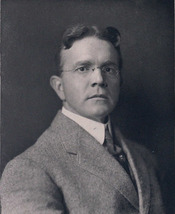Henry Moore Bates (March 30, 1869 – April 15, 1949) was an American lawyer. He was dean of the University of Michigan Law School for 29 years.[1]
Born in Chicago, Bates received a Ph.B. from the University of Michigan in 1890 and a LL.B. from Northwestern University in 1892.[2] After practicing law at Chicago, 1892–1903, he became Tappan Professor of Law at the University of Michigan and was made dean of the Law School there in 1910. In 1917–18 he was professor of law at the Harvard Law School and in 1921 he was appointed Commissioner of Uniform State Laws. He was president of the Association of American Law Schools (1912–13), a member of the Executive Committee of the American Institute of Criminal Law (1911–14), and president of the Order of the Coif (1913–16). He was elected a Fellow of the American Academy of Arts and Sciences in 1938.[3] Bates retired as dean in 1939.[1]
References
- ^ a b Harlen F., Stone (November 1939). "Henry Moore Bates" (PDF). Michigan Law Review. 38 (1): 1–2. doi:10.2307/1283289. JSTOR 1283289. Retrieved May 21, 2011.
- ^ "Bench & Bar of Michigan: Nineteen Hundred Eighteen". 1918. Retrieved May 21, 2011.
- ^ "Book of Members, 1780-2010: Chapter B" (PDF). American Academy of Arts and Sciences. Retrieved May 21, 2011.
External links
- Michigan Law Review memorial article, June 1949
- This article incorporates text from a publication now in the public domain: Gilman, D. C.; Peck, H. T.; Colby, F. M., eds. (1905). New International Encyclopedia (1st ed.). New York: Dodd, Mead.
